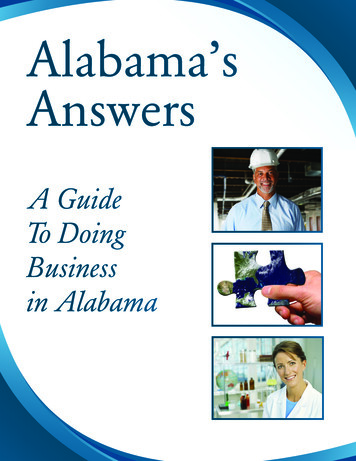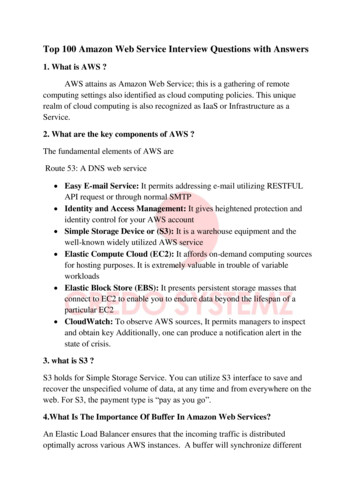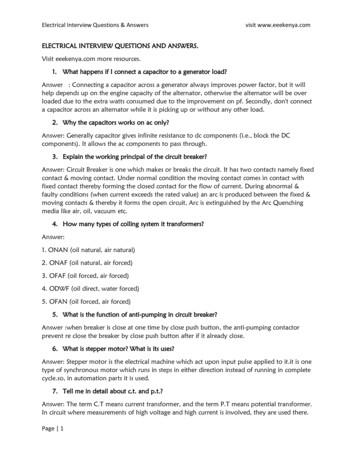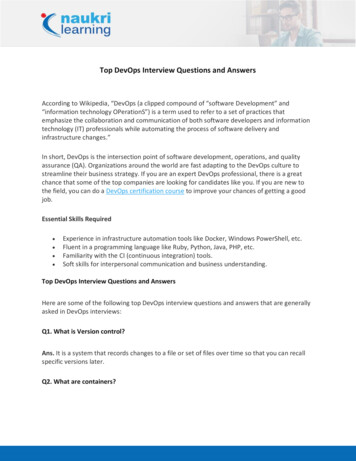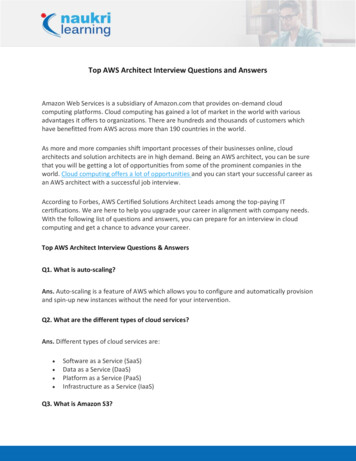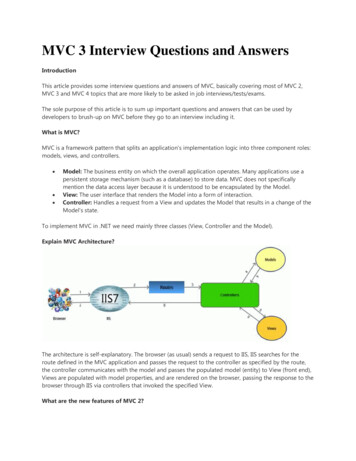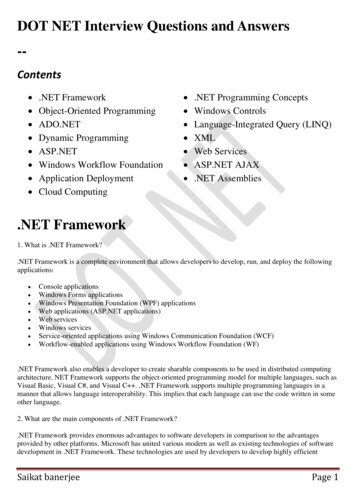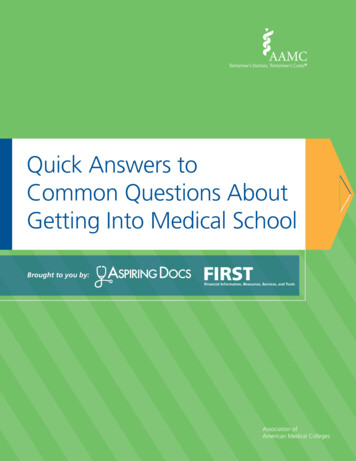
Transcription
Quick Answers toCommon Questions AboutGetting Into Medical SchoolBrought to you by:FIRSTFinancial Information, Resources, Services, and ToolsAssociation ofAmerican Medical Colleges
Quick Answers to Common Questions About Getting Into Medical Schoolis copyright 2013 by the Association of American Medical Colleges.This e-book is brought to you by the staff of the Aspiring Docs and FIRSTprograms of the Association of American Medical Colleges (AAMC).Aspiring Docs gives you resources to help you figure out the basics,including how to shadow a doctor, apply to medical school, make themost of your gap year, and more.FIRST (Financial Information, Resources, Services, and Tools) helps younavigate the complex issues of financial aid, student debt, and moneymanagement.The Association of American Medical Colleges (AAMC), administratorof the MCAT exam and AMCAS , provides information and services toguide you on your medical career path. From medical school preparationto financing your education, finding training opportunities to choosing aspecialty, AAMC is here to help you navigate your medical career.2
Table of ContentsChapter 1: The BasicsChapter 5: Paying for Med School526272829303167How Do I Decide if Medicine is Right for Me?How Do I Partner with My Advisor?How Do I Make the Most of my Gap Year?Chapter 2: Getting Experience10 How Do I Shadow a Doctor?11 How Do I Find Health-care Related VolunteerOpportunities?12 How Do I Get Lab Experience?13 What’s It Like to Participate in SummerMedical and Dental Education Program(SMDEP)?323334353637Chapter 3: MCAT ExamHow Do I Pay for Med School?How Do I Create a Budget?How Do I Build Good Credit?How Can I Afford Medical School?What is the Cost of Applying to Medical School?What are Financial Implications of aPost Bac program?What Should I Consider as a Non-TraditionalStudent?What is the Financial Aid Application Process?What are the benefits of Federal vs. PrivateEducational Loans?When Should I Consider a Direct Stafford Loan?When Should I Consider a Direct PLUS Loan?Unforeseen Emergencies and Financial Needs –What to do?What is an Award Letter?How Can I Make a Smooth Transition toMedical School?16 How Do I Prepare for the MCAT Exam?17 What’s It Like to Take the MCAT Exam?18 How Do I Prepare for the MCAT2015 Exam?3839Chapter 4: ApplyingChapter 6: What Med School is Like20212223How Do I Apply to Medical School?How Do I Decide Where to Apply?How Do I Apply to a M.D./Ph.D. Program?How Do I Apply as an InternationalApplicant?24 How Do I Make Sure Social Media Doesn’tHurt My Chances?41 What’s It Like to Participate in the White CoatCeremony?42 What’s It Like to Take Anatomy Lab?43 What’s It Like to See a Patient for the First Time?44 What’s It Like to Go to a New* Medical School?46 What’s It Like to Participate in a B.S./M.D.Program?47 What’s It Like to Be an Undergrad in a B.S./M.D. Program?48 What’s It Like to Do a M.D./Ph.D. Program?3Association of American Medical Colleges
Chapter 1:The BasicsChapter 2:Getting ExperienceChapter 5:Paying for Med SchoolHow Do I Make the Most of my Gap Year?Chapter 4:ApplyingHow Do I Decide if Medicine is Right for Me?Chapter 3:MCAT ExamCHAPTER 1:The BasicsHow Do I Partner with My Advisor?Chapter 6:What Med School is Like
How Do I Decide if a Career in Medicine is Right for Me?Should I become a doctor?How much education does it take to becomea doctor?Think about what kind of future appeals to you. Do youlike challenges? Are you interested in science and how thebody works? Do you care deeply about other people, theirproblems, and their pain? Are you a good listener? Do youenjoy learning? Are you intrigued by the ways medicine canbe used to improve life?Becoming a doctor requires a serious educationalcommitment. It typically takes from 11 to 16 years tocomplete your education, including four years of college(undergraduate school), four years of medical schooland anywhere from three to eight years of training in aspecific specialty area (residency training), depending onwhich specialty you choose to pursue. In order to maintaina medical license, doctors are also required to continuetaking courses and learning about advancements in theirfield throughout their career.If you answered “Yes” to most of these questions, chancesare you have the right personality for a medical career.What is a doctor’s job like?Physicians diagnose and care for people of all ages whoare ill or have been injured. They take medical histories,perform physical examinations, conduct diagnostic tests,recommend and provide treatment, and advise patients ontheir overall health and well-being.How much do doctors make?What is their schedule like?Salaries vary depending on where physicians live and thetype of medical specialty they practice. This graph will giveyou an idea of median starting salaries by specialty.While there are several different types of physicians, theycan usually be divided into three broad categories:While salaries for physicians are among the highestfor all occupations, the work hours can be long andunpredictable. Many doctors work more than 60 hours aweek. They may also have to respond to emergencies andbe on call for their patients. Work hours vary depending onthe type, size and location of practice. Primary care physicians are the doctors patients usuallyvisit most frequently. They treat a wide range of illnessesand regularly provide preventive care, and they alsoenjoy long-term relationships with their patients.Pediatricians, family practitioners and general internistsare primary care physicians.SAMPLE SPECIALTIES AND SALARIES: Surgeons perform operations to treat diseases andrepair injuries.Median Starting Salary: First Year Post ResidencyMedian StartingSalary: First year post residency oror FellowshipCompendation Specialists have expertise related to specific diseases, agegroups, and bodily organs. Cardiologists, psychiatrists,geriatricians and ophthalmologists are examples ofspecialists. The AAMC’s Careers in Medicine web sitecontains information and links about various specialtiesin medicine.fellowship compensation K 50K 100K 150K 200K 283K 280KEmergency Medicine 242KAnesthesiology 225K 208K 180KPsychiatryfor more information please visit:OphthalmologyCareers in Medicine Specialty nts/cim/specialties/ 173KInternal Medicine 160KFamily Practice (w/o OB) 160KPediatricsPhysician Compensation: ion.pdf 300KDermatologyOB/GYNwww.aamc.org/aspiringdocs 250KSurgery: General 135KSource: MGMA Physician Compensation and Production Survey: 2011. Report based on 2010 Data.5Association of American Medical Colleges
How Do I Partner with My Advisor?How do I find an advisor?What questions should I be asking?Carol Baffi-Dugan, Director for Health Professions Advisingat Tufts University and Director of Communications forthe NAAHP, suggests finding out who the premed orhealth professions advisor is at your school. S/he may bein the Academic Dean’s office, a science professor, or acounselor in the Career Services office. Some colleges havea separate pre-professional advising office that includesadvising services for premed students, those interested inother health careers, and perhaps even pre-law students.Most premed advisors also maintain websites that can helpyou contact them or the advising office, so search yourschool’s website. Even if there is no specifically designatedpremed advisor, try to meet with someone in one of thedepartments mentioned above. If no one at your school isavailable to help, visit the National Association of Advisorsto the Health Professions (NAAHP) website and click onAdvisor Resources, then, Find An Advisor.Ask your advisor which courses are required for medical schooland how to best sequence them at your school. You can askabout ways to gain health-related experiences, internships andlab experiences. You can learn about the MCAT, discuss whenyou’re best prepared to take the exam, and learn if the schooloffers any prep courses. It’s also a good idea to ask detailedquestions about the timeline for applying to medical school.What is my responsibility?You should actively seek out your advisor and follow up on theadvice and suggestions s/he gives you. While your advisor maybe very supportive of your goals, s/he will also challenge youto do your best work and objectively evaluate your objectives.Your advisor cannot earn the good grades and participate inthe health-related experiences you’ll need to be a competitiveapplicant. That is up to you.What if I’ve been out of school for many years?When should I contact an advisor?There is no age limitation on applicants or when it comes towho will make a good doctor. Many individuals decide laterthat this is the path they want to pursue. Others were not assuccessful as they wanted to be in their early experience, butwith renewed motivation and effort can become competitiveapplicants. Premed advisors know all this and work withstudents of all ages as they prepare for medical school. Youshould go back to your home institution (alma mater) to findout what services they offer alumni. Many premed advisors willwork with their alums in planning for and applying to medicalcareers.Contact your premed advisor as soon as you think you’reinterested in a medical career. There’s a lot of planning andpreparing that has to be done before you’ll be ready toapply to medical school, so the earlier, the better. See if youcan make an individual appointment with your advisor, goto drop-in hours, or attend a workshop. Be sure to registerto receive any emailed updates, or newsletters. Also checkto see if there’s a Facebook page or Twitter feed you canfollow.What can they help with?What if I am in high school and I’m looking at BS/MD programs? Is there still a pre-health advisor thatI can work with?Your advisor can help you learn about the medicalprofession and help you ask the right questions to decide ifit’s the right career for you. Then, you can work together todevelop a plan to get to you where you want to go.If you are in high school and are considering BS/MD programsyour best resources are the premed advisors at those programs.Typically the admissions offices at those colleges and universitiesprovide information on the structure of the programs, thesupport services, and the policies and procedures. Check outthe AAMC’s Medical School Directory for basic information,including website and contact information for numerouscombined Baccalaureate/MD programs. More detailedinformation about these programs and medical schools can befound in the MSAR Online.for more information please visit:NAAHP: www.naahp.orgMedical School AR Online: tion of American Medical Colleges
How Do I Make the Most of my Gap Year?What kinds of experiences during a gap yearwill help me become a better physician?A “gap year” is the period of time between the end of yourundergraduate education and the start of medical school. Infact, a gap year might be a year or more depending on eachperson’s particular circumstances. Frequently, the reasons fora gap year center on an applicant’s need for more time toparticipate in medically-related volunteer and lab experiences,strengthen GPA or MCAT scores, pay down debt, work onbecoming a stronger candidate, or simply need a break.Some applicants must take a gap year if they are notaccepted into medical school.Look for experiences that will help you improve your areasof weakness. Speak to the pre-health advisor at yourschool, or an admissions dean or director at a medicalschool to help identify areas that you need to expand orstrengthen. Volunteer in a medically-related field. Meaningfuland sustained experiences working with patients or ina medically-related environment is not only beneficial inhelping you to solidify your choice to pursue medicine,it also makes you a stronger and more knowledgeablecandidate. These experiences will also help you duringthe interview stage.What should I focus on accomplishing during mygap year?A gap year is a good time to get your academic and financialhouse in order. But don’t make the mistake of trying to“pad” your application. Admissions committees are easilyable to spot this and it could end up hurting, rather thanhelping you. Shadow physicians. Shadowing or following aphysician can provide you with patient experience anda realistic view of what various specialties and workingenvironments are really like. It can sometimes bedifficult to arrange a shadowing experience if you don’thave a personal relationship with a physician. For tipson how to get this type of experience, read the “HowDo I Shadow a Doctor?” fact sheet. Strengthen your GPA by taking extra and/or highlevel coursework. Academically, this time can beextremely beneficial whether you already have a strongGPA or not. There may be a course you didn’t have timeto take that will prove your ability to master upper-levelscience coursework. Participate in a scholarly activity. Real andmeaningful experience in a lab or research facilityprovides for more in-depth knowledge about medicine,and helps you to have a better understanding of thedifferent research processes. Whether you’re conductingyour own research or assisting on a project, thissustained scholarly activity is very attractive to medicalschools. For tips on how to get this type of experience,read the “How Do I Get Lab Experience?” factsheet. Study for the MCAT Exam. Without a full course loadcompeting for your time (depending upon your workschedule of course), you’ll have more time to devoteto MCAT preparation. Be sure to check out the MCATresources on the AAMC’s Web site. Pay down your existing debt as much as possible.Even if you’re fortunate enough not to have anyundergraduate debt, start saving money so that you’ll havea cushion when you begin medical school. If you
questions about the timeline for applying to medical school. What is my responsibility? You should actively seek out your advisor and follow up on the advice and suggestions s/he gives you. While your advisor may be very supportive of your goals, s/he will also challenge you to do your best work and objectively evaluate your objectives.

